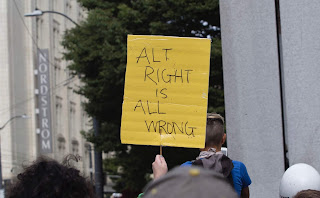In this interview with Truthout, I discuss several
topics related to the U.S. far right, such as fascism, populism,
relations with federal security forces, and Donald Trump’s politics. The interview follows Truthout’s publication of an excerpt from Insurgent Supremacists. Here are some excerpts from the interview:
Every far-right upsurge in the US over the past 40 years has been
powered by different rightist currents coming together. In the 1980s,
the convergence between Klan and Nazi forces — which had distrusted each
other for half a century — gave us the modern white nationalist
movement. In the 1990s, the explosion of Patriot/militia groups was
fueled by a new mix of white nationalism, Christian Reconstructionism,
John Birch-style conspiracism and gun rights ideology. Over the past
decade, the rise of the “alt-right” has followed the same dynamic.
Federal security forces do their job clumsily at times and skillfully at
others, are subject to a variety of internal biases and external
pressures, and have to contend with shifting political circumstances.
Fundamentally, however, their purpose is to protect ruling-class power.
Broadly speaking, paramilitary rightists serve that purpose when they
defend the existing order, and clash with that purpose when they seek to
overthrow it.
As many “alt-rightists” have understood clearly from the beginning,
Donald Trump is not a far rightist. His policies are racist but not
white nationalist (because he doesn’t advocate a white ethno-state and
the mass expulsion of people of color) and authoritarian but not fascist
(because he wants to suppress opponents but doesn’t aim to impose one
totalitarian ideology on all spheres of society). Also, unlike fascists,
he did not build an independent organization, but instead cobbled
together an elite coalition of “America First” nationalists and
mainstream conservatives, and over time the latter have mostly come out
on top. Despite some inconsistent steps away from the establishment line
on free trade and foreign policy, Trump’s main impact has been to
intensify conventional conservative policies, such as deregulating
industry, making the tax system even more regressive and making life
even harder for undocumented immigrants.To be clear, Trump isn’t just more of the same. He builds on his predecessors (Republican and
Democrat), but he is qualitatively worse than them. Trump is
accelerating the decline of the United States’ liberal-pluralist system
(often mislabeled “democracy”), and his rise has helped to mobilize
popular forces that have the potential to turn toward more insurgent
forms of right-wing politics. In this situation, it’s important for
leftists to join with others in opposing the growth of repression,
demonization and supremacist violence. At the same time, it’s also
important for us to strengthen and amplify our own critiques of the
established order, our own visions of radical change — and not let far
rightists present themselves as the only real opposition force.
Photo credit: By Tiffany Von Arnim. August 13, 2017 Patriot Prayer and Solidarity Against Hate demonstrations in Seattle. [CC BY 2.0], via Wikimedia Commons.
